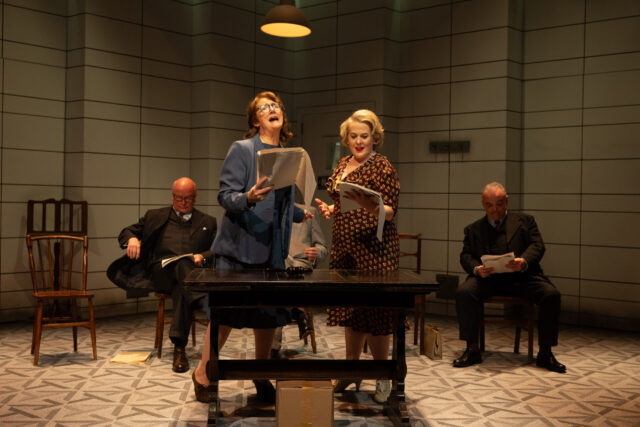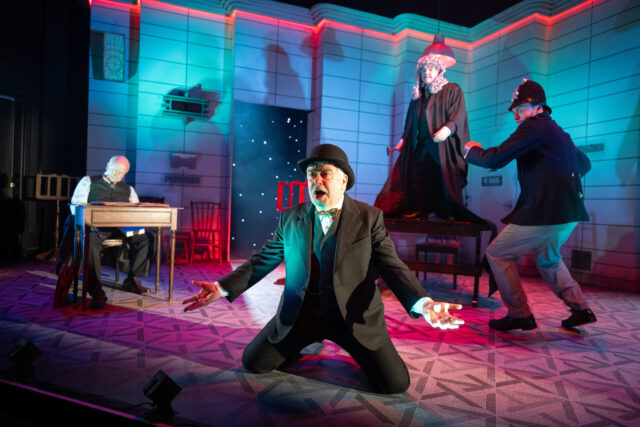
The March of Time reenacts a critical censorship trial in The United States vs. Ulysses (photo by Nir Arieli)
THE UNITED STATES VS ULYSSES
Irish Arts Center
726 Eleventh Ave. between Fifty-First & Fifty-Second Sts.
Tuesday – Sunday through June 1, $26-$76
irishartscenter.org
James Joyce’s earth-shaking novel, Ulysses, used a unique stream-of-consciousness method to tell the Odyssey-inspired story of a day in the life of Leopold Bloom, Molly Bloom, and Stephen Dedalus in Dublin. Colin Murphy attempts to incorporate a similar technique in the North American premiere of Colin Murphy’s The United States vs. Ulysses, with decidedly mixed results.
Published in 1922, Ulysses was first serialized in 1918–20 and banned in the United States under the Comstock Act, which deemed it obscene. A dozen years later, Random House cofounder Bennett Cerf arranged with ACLU attorney Morris Ernst to have a copy of the book mailed to the publisher in New York, provoking its seizure at the border, which enabled them to mount a challenge to the ban. Their stunt led to United States v. One Book Called Ulysses, a test case in which they claimed freedom of speech and expression; the trial judge was John Munro Woolsey, with Sam Coleman representing the government. Joyce himself was not part of the case.
Murphy and director Conall Morrison center the play around a December 8, 1933, March of Time radio broadcast re-creating the trial as breaking news. The show has three interweaving sections, switching between the radio play, in which the performers are at a table, using sound effects and reading the dialogue; the trial itself; and a chapter of the book brought to life. Unfortunately, it leads to a choppy narrative flow and confusion about who is who at numerous points.
Mark Lambert is actor Scott from The March of Time, lawyer Ernst, and J. J. O’Molloy from Ulysses; Ross Gaynor is Art / Cerf, Coleman, and minister Alexander J. Dowie / Blazes Boylan; Ali White is Arlene / editor and publisher Margaret Anderson and Margaret Ernst / the voice of Ulysses; Morgan C Jones is Ray / Woolsey, Ezra Pound, and James Joyce / the judge; Clare Barrett is Charme / publisher Jane Heap and Nora Barnacle, Joyce’s wife / Molly Bloom, Gerty MacDowell, and Bella Cohen; and Jonathan White is the director and Leopold Bloom.
Liam Doona’s set features various chairs and tables that are moved around to indicate whether we are in the recording studio, the courtroom, or a scene from the novel; small changes in Catherine Fay’s costumes and John Comiskey’s lighting try to distinguish the characters, with limited success.

Historical drama includes a dream sequence that goes inside James Joyce’s Ulysses (photo by Nir Arieli)
One of the more intriguing scenes occurs when Margaret Anderson and Jane Heap, the publishers of The Little Review, the literary magazine that was serializing the novel, talk about censorship with Ezra Pound, getting into how absurd it all is.
Heap: This is the most beautiful thing we’ll ever have.
Anderson: It is a prose masterpiece. I glory in it!
Heap: We’ll print it if it’s the last effort of our lives.
Pound: We’ll be damn well suppressed again if we print Joyce’s text as it stands!
Anderson: We are committed to the free speech of our authors.
Pound: If our authors would speak just a little less freely, the Post Office might not feel so free to seize the damn magazine and burn it.
Heap: Mr. Joyce’s words are sacrosanct.
Pound: Joyce’s words are just as damn well flammable as any other words. What use is his genius on a bonfire?
Anderson: This obscenity law is unjust, Mr. Pound — we should campaign against it.
Pound: The law is grotesque, barbarous, ridiculous, risible, idiotic, monstrous, pestilent — but it could shut us down.
Voice of Time: So — without consulting Mr. Joyce – they agree among themselves to remove some of the phrases most likely to alarm the censors . . .
Anderson: Here’s one: “He felt heavy, full: then a gentle loosening of his bowels.”
Pound: God, the man is revolting.
Heap: “Loosening in his stomach”?
Anderson: How about his “belly”?
Heap: “Loosening in his belly” sounds silly.
Pound: We could just cut the mention of “bowels” — “He felt heavy, full: then a gentle loosening.”
Heap: That should do. What’s next?
Pound: Try this: “Now it could bear no more. Dead: an old woman’s: the grey sunken (coughs) of the world.”
Anderson: “The grey sunken belly of the world”?
Pound: Good!
Anderson: Next?
Rebecca West and Virginia Woolf disagree on the merits of Ulysses. English author Arnold Bennett declares, “Ulysses is more indecent, obscene, scatological, and licentious than the majority of professedly pornographical books . . . and I have read most of them.” Morris Ernst drops some F-bombs. Molly cries out “Yes!” over and over again like she’s having an orgasm every time the court considers allowing an excerpt from the “Nighttown” section of Ulysses to be read aloud. Some of those moments are funny; others feel out of place.
While there was a March of Time episode dedicated to the trial, no documentation has survived, so Murphy pieced it together using the court transcript, newspaper and magazine articles, and such sources as Declan Dunne’s Set at Random, but the varying elements never connect, ending up with a scattershot recounting that makes it hard for the audience to distinguish fictional exchanges from those based on the historical record.
The show is, sadly, still relevant today, as schools and stores ban so many books from their shelves. Perhaps the best reason to see The United States vs. Ulysses is that it will make you pick up that dusty copy of Ulysses you’ve been promising yourself for decades that you would finally read.
[Mark Rifkin is a Brooklyn-born, Manhattan-based writer and editor; you can follow him on Substack here.]